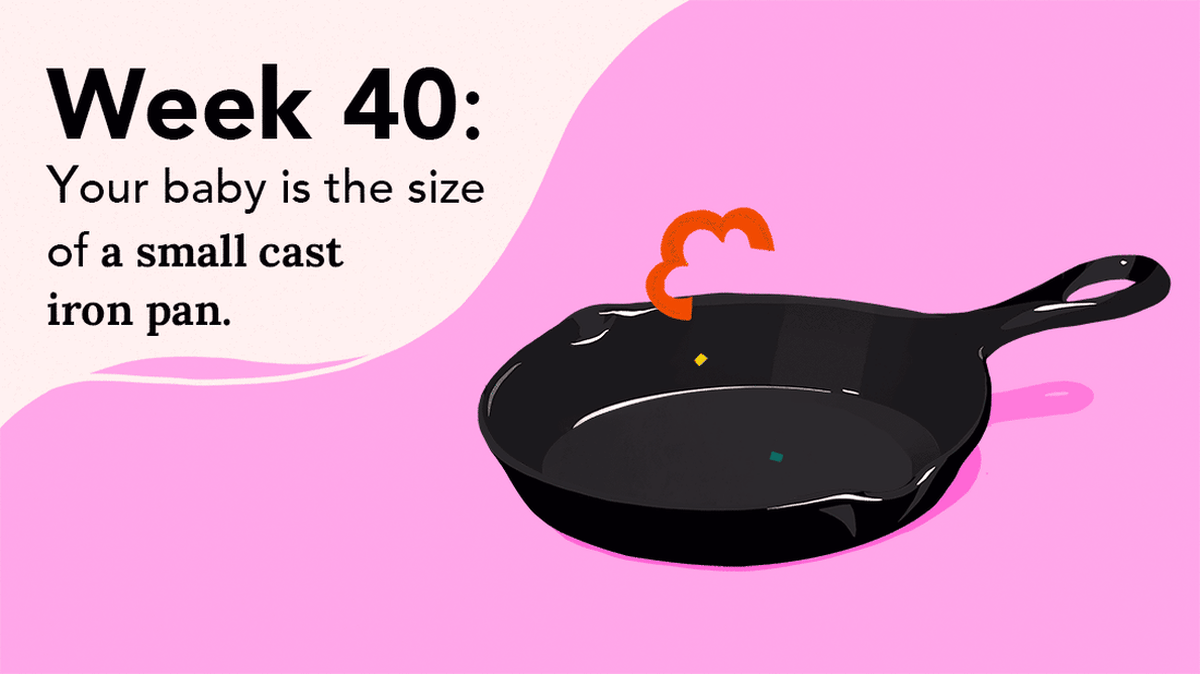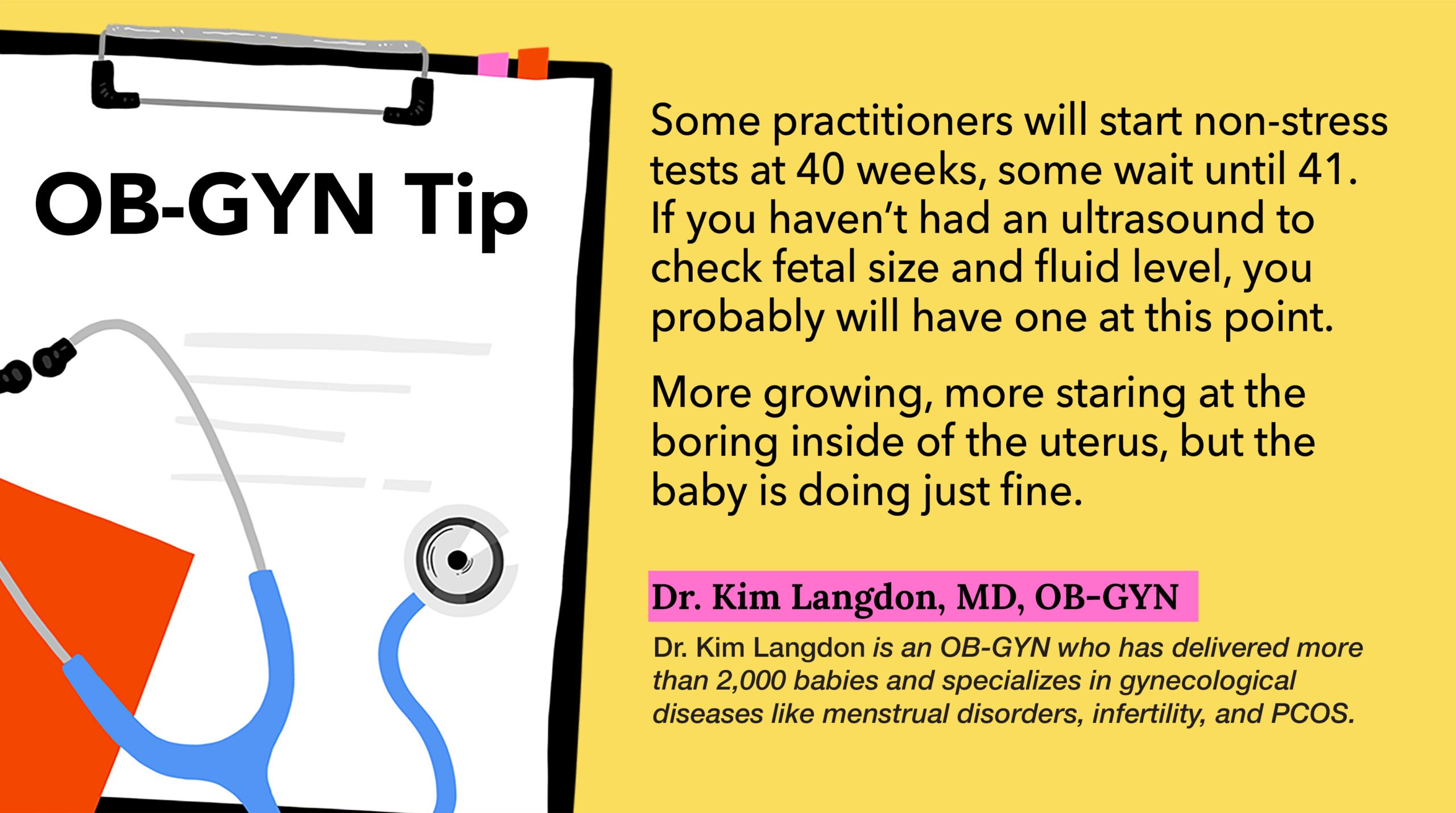
In this article
You’re 40 weeks pregnant!
The day you’ve been counting down to all pregnancy long is finally here: Your due date. Now, you’re officially 40 weeks pregnant, and your baby is around the size of a small cast iron skillet. Some pregnant people never make it to 40 weeks, but others go beyond it. If you’re still expecting, don’t worry — you’ll meet your baby sooner rather than later.
Appreciate these final days with your bump (as much as you can, considering how exhausted and sore you might be at this point) and enjoy it, because your baby will be in your arms any day now.
Pregnancy symptoms at 40 weeks

You’re pretty familiar with pregnancy symptoms at this point … and you’ve probably noticed that some of them are more than happy to stick around until the last minute. You may be experiencing different symptoms now that are signs that labor is imminent, like:
Your mucus plug
You may not have heard of it before pregnancy, but the mucus plug is another one of those beautiful little secrets about the miracle of life. It’s a collection of jelly-like fluid that helps keep bacteria out of your uterus, and as you get closer to birth, you may notice that it appears slowly over time or all at once as vaginal discharge.
The bloody show
You may notice that, before going into labor, you have a small amount of bleeding called the bloody show, which is caused by blood vessels rupturing in your cervix. If you do see this bleeding, it’s a good idea to call your OB-GYN.
Leaking fluid
If you’ve noticed that you’re leaking fluid, it could be a sign that your water has broken. If this happens, call your OB-GYN or head straight to labor and delivery — it might be baby time!
Pelvic pressure
As your baby prepares for birth, you’ll experience something called “lightening,” which some moms call the baby “dropping.” This comes with extra pelvic pressure, increased urination, and you may find that you are finally able to take your first deep breath in months.
What does 40 weeks equal in months?
In week 39 of pregnancy, how many months along are you? You’re nine months pregnant this week!
Your ultrasound
This close to birth, you’re probably not having ultrasounds anymore, but absence makes the heart grow fonder, right? You’ll see your baby’s sweet face soon, and in the meantime, know that they’re in there, doing baby things like kicking and sucking their thumb while they prepare to meet you.
Your pregnant belly at 40 weeks

A full term pregnancy means that you’ve gained around 25-30 pounds, give or take depending on your body and your individual pregnancy. Your baby may have also reached their birth weight — somewhere around six or seven pounds, though all babies are different.
Pregnancy tips at 40 weeks
As you’ve reached your due date, your OB-GYN might want to perform something called a “membrane sweep” to help push labor along. This involves your provider inserting a gloved finger into your vagina to strip the membranes outside of your amniotic sac. Sometimes, this means going into labor hours or days later — sometimes, it doesn’t make much of a difference.
It’s totally up to you whether or not you decide to have your membranes stripped. There’s no wrong answer — just what you’re comfortable with.
Your pregnancy checklist at 40 weeks
Your baby is about to arrive, and that means that most of your prep for baby and the postpartum period is done. But while you wait for go time, here are a few things you can do:
- Schedule your 41-week appointment (just in case)
- Talk to your OB-GYN about whether an induction is necessary
- Make sure your hospital bag is completely packed
- Make arrangements for childcare and pet care while you’re in the hospital, if necessary
- Rest and try to enjoy these final days before your baby arrives!
What are you eating for you and your baby?

Right now, you might be itching to bring on labor … and what you eat might have a little something to do with when it happens, according to what some people like to believe. The science behind this idea is iffy at best, but it can be fun to try out different foods thought to get the process going, like:
- Dates
- Pineapple
- Spicy foods
- Balsamic vinegar
- Eggplant
When to call your doctor
Right now, it’s important to be on the lookout for signs that your baby is less active or that labor is about to begin, like:
- Your baby isn’t as active as they usually are or isn’t meeting kick counts
- Contractions that are five minutes or less apart
- Bleeding
- Your water breaks
- Sudden and unusual swelling, which could indicate pre-eclampsia
At this point in your pregnancy, your OB-GYN may advise you to go straight to labor and delivery instead of calling them first. Be sure to find out what the protocol is with your office.
Note: If you are visiting a medical professional during COVID, make sure to ask about the facility’s safety measures and confirm that they are following COVID protocols as indicated by the CDC.
Special Concerns: Twins/Multiples
Many twin and multiple pregnancies don’t make it to 40 weeks — in fact, most doctors consider 38 weeks to be full term for pregnancies involving more than one baby. But if you’re expecting multiples and have made it to week 40, it might be time to talk to your OB-GYN about the possibility of inducing labor.






